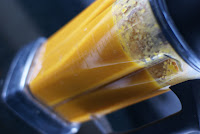True or False: Having Your Pasta 'Al Dente' Reduces The Postprandial Glucose Surge. Plus: Do Spaghetti Really Produce a 50% Lower Glycemic Response Than Macaroni?
 |
| Is Pasta OK, if it's al dente? Sounds legit, right? How legit does it sound, if I tell you that pasta is ok, anyway? |
I mean, aside from the fact that I have to say that the Italians are not as lean as you Americans apparently believe (31.8 % are overweight and 8.9 % are obese) it sounds legit that the hard pasta will take longer to digest. This would (or should I write "should?") reduce its GI and that in turn should help you to stay / get lean. So what?
Will having your pasta 'al dente' lead to a major reduction in glycemic load?
False. While it sounds totally logical that overcooked pasta should have higher glycemic indices and thus - assuming identical intakes - glycemic loads, a 1986 paper by Wolver et al. shows quite conclusively that this is not the case.
 |
| Figure 1: Glycemic response 0-180min after test meals containing 66g of white bread or pasta (dry weight) in 11 non-insulin-dependent and 6 insulin-dependent diabetic patients (Wolever. 1986) |
And what about pasta with eggs? As logical as it may seem, Granfeldt, Björck, and Hagander did not observe any differences between regular and egg-enhanced pasty in their 1991 study. This is yet not the only similarity to the Wolever study: White bread easily "outperformed" all the three tested varieties of fresh roll-sheeted linguine (thick, thin, thin with egg) when it came to the postprandial glucose levels. What's new, though, is that the glucose spike was followed by a drop into the hypoglycemia zone.
As useless as the "tricks" may be compared to the "American spaghetti", i.e. white bread, pasta is more or less harmless... unfortunately, the glucose surge is not the only reason spaghetti, macaroni and star pastina end up on your hips pretty easily, which is why I'd still suggest you eat them in moderation (I don't suggest that for white bread - unless you actually want to gain weight, you better don't eat that at all ;-).  |
| Potatoes are harmless and by no means the pro-diabetic obesogenic horror food some people say... unless you juice them, of course (learn more) |
Bottom line: It's a matter
of taste whether you want to watch the clock closely when you prepare your pasta. If you are really enjoying the mash that's floating around
in the steaming water after 15 minutes, go for it. Contrary to potatoes
where both cooking time, but more importantly post-processing like
mashing can have a major impact on the hyperglycemic effects of the
tubers (cf. "The Potato Manifesto"; Part 1, Part 2), it does not really matter for spaghetti. Apropos spaghetti, the statistically significant difference in postprandial glucose levels between spaghetti and macaroni is probably physiologically irrelevant.
The latter cannot be said of the blood glucose surge the subjects in the Wolever study experience after the white bread meal. No wonder that a recent study by Dressler et al. which identified bread, not pasta, as one of those food-likings that distinguish overweight / obese from lean / normal women (Dressler. 2013), is only one of a dozen or more of studies, where (white) bread made it into the real-world Top 3 of the most obesogenic foods.
The latter cannot be said of the blood glucose surge the subjects in the Wolever study experience after the white bread meal. No wonder that a recent study by Dressler et al. which identified bread, not pasta, as one of those food-likings that distinguish overweight / obese from lean / normal women (Dressler. 2013), is only one of a dozen or more of studies, where (white) bread made it into the real-world Top 3 of the most obesogenic foods.
- Dressler, Heidi, and Chery Smith. "Food choice, eating behavior, and food liking differs between lean/normal and overweight/obese, low-income women." Appetite (2013).
- Wolever TM, Jenkins DJ, Kalmusky J, Giordano C, Giudici S, Jenkins AL, Thompson LU, Wong GS, Josse RG. Glycemic response to pasta: effect of surface area, degree of cooking, and protein enrichment. Diabetes Care. 1986 Jul-Aug;9(4):401-4.


